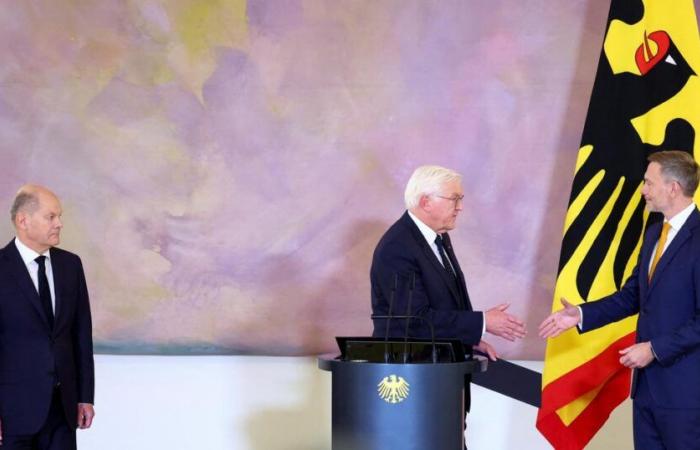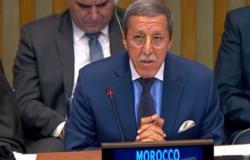FIGAROVOX/MAINTENANCE – German Chancellor Olaf Scholz has decided to dismiss his liberal Finance Minister, which puts the ruling coalition in danger and could lead to early legislative elections in early 2025. Political scientist Patrick Moreau, specialist in Germany, analyzes the consequences of such a decision.
Patrick Moreau is a historian and political scientist, specialist in Germany and extremism. He notably published The Other Germany: The awakening of the extreme right (Vendémiaire, 2017).
LE FIGARO. – Chancellor Olaf Scholz dismissed his Finance Minister, the liberal Christian Lindner, on Wednesday, a few hours after the election of Donald Trump. Concretely, what will happen between now and the likely holding of early legislative elections?
Patrick MOREAU. – For the moment, it is difficult to know because no decision has been made. Chancellor Scholz, at the head of a now red-green coalition after the resignation of all liberal ministers, suggested to the leader of the CDU (Christian Democratic Union) Friedrich Merz not to immediately call early legislative elections. Its objective is to have a certain number of texts adopted with the help of the center-right party, as long as the law allows. Naturally, the CDU and its ally CSU (Christian Social Union) responded in the negative and are demanding elections as quickly as possible. Olaf Scholz plans to call on deputies to decide on January 15 on the holding of early legislative elections, the conservatives are demanding them immediately. We understand them, they are almost sure to win.
A major fact is that German news coincides with major American news. Whether there is a correlation is difficult to say. In any case, the hypothesis of a return of Donald Trump has not been intelligently managed across the Rhine. Foreign Minister Annalena Baerbock has explicitly positioned herself against Trump. A serious error, because it was obviously not his role to express this opinion on behalf of the country. In the process, the one who was still a candidate for the White House took public note of German disaffection towards him, while Scholz struggled to try to put the pieces back together. This unpreparedness for Trump 2 may have accelerated a form of disorder in Germany, although it would be daring to link the two events.
In any case, many new questions arise about the war in Ukraine, the future of NATO, the turn of world trade, which the CDU conservatives on their way to power are seriously beginning to address internally. Real operations will begin in early 2025, once Donald Trump takes office and Germany has a new chancellor, probably the conservative Friedrich Merz.
Was the explosion of the coalition, however sudden, predictable?
To tell the truth, no informed observer believed that this baroque alliance would last until the deadline of 2025. Scholz’s decision was sudden, but his government had to break up one way or another. It was a tripartite coalition, by nature relatively unstable. Its components no longer spoke to each other, which poses a problem when governing together. The level of aggression achieved was quite exceptional. Christian Lindner, also head of the FDP (liberal democratic party), blithely exposed his differences on economic matters with a view to blowing up the coalition.
The cacophony reigning in the tricolor coalition had become harmful and untenable in the long term in the eyes of the population, the very bland personality of Scholz not helping matters.
Patrick Moreau
The parties have been refining their programs and preparing their campaign financing for several months now. Everyone just has to take out of the drawer what they have developed, a little prematurely of course, but the hypothesis was widely considered by everyone. Lately, the Chancellor has reacted more and more knee-jerkly to FDP provocations. The Liberal Party has also taken a great risk because, if it falls below the 5% waterline and therefore disappears from Parliament, going back up will prove very complicated. On a political level, this disintegration is not likely to change much, especially since federal elections were scheduled for September 2025.
The last coalition breakdown dates back to 1982. Already, the liberals of the FDP had defected, the social democratic chancellor Helmut Schmidt had resigned, and the conservatives had come to power. Could the scenario repeat itself? What do the polls say in the event of early legislative elections?
Yes, it could be to the extent that the same actors as 40 years ago are at the center of the game. But the context no longer has anything to do with it because reunification has happened there. In the 1980s, the far right was much less powerful than today, while the DKP communists were scraping by. In 2024, the AfD is credited with 15 to 20% of the votes, the far left of Sahra Wagenknecht will win between 6 and 10% of the votes. The two coalition ruptures are both comparable in that the scenarios are similar, and incomparable in that the system has undergone profound changes.
In terms of political power relations, the situation remains similar to what it was the day before yesterday. We are not sure that the FDP will remain present in the Bundestag, because it is announced to be slightly below 5% of the votes, the representative threshold. The SPD is expected to collapse to around 15%, perhaps a little more, which would constitute a considerable electoral failure. The least we can say is that the future is not rosy for German social democracy.
Also read
Olaf Scholz’s coalition drags down the Franco-German couple
We will undoubtedly have a grand coalition bringing together a weakened SPD, holding a small number of ministries, and a strengthened CDU-CSU. Friedrich Merz, the head of the CDU, would then likely lead the new government. We can be certain that the conservatives of the CDU-CSU will refuse to ally with the nationalists of the AfD and, even if they would like to, it is not said that this is mathematically possible. An alliance of the conservatives with the radical left party of Sahra Wagenknecht is highly unlikely. Finally, the hostility of the CSU towards the Greens highlights in fact the latter out of play.
How do Germans perceive this political disorder?
The opinion polls are clear. The majority of Germans are in favor of elections, at 53%. Supporters of the AfD and those of Sahra Wagenknecht, who can reasonably hope for progress, are even more massive. Supporters of the Greens and SPD are largely against it, because they know they have a lot to lose. Change never comes without fear for the future: 40% of those questioned are hostile to the dissolution of the Bundestag. But the cacophony reigning in the tricolor coalition had become harmful and untenable in the long term in the eyes of the population, the very bland personality of Scholz not helping matters.






